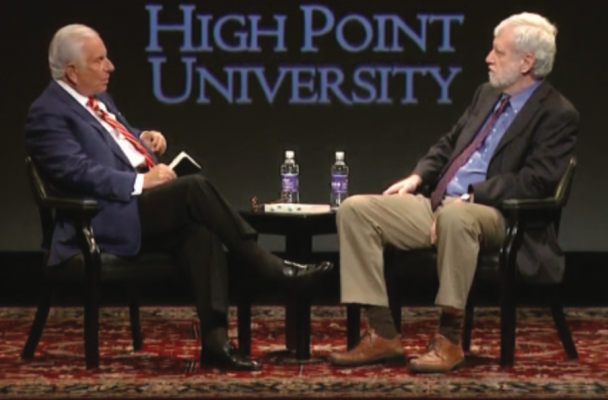UNC-TV Skill Series aires with Dr. Qubein and guests

By Nicholas Bainbridge// News Editor
Airing on UNC-TV, Dr. Nido Qubein of High Point University has been hosting talks with notable individuals. The goal of this series is to use the experience of successful people to pass on invaluable life skills to others so that they may make use of the wisdom themselves. Each of these episodes in the series initially air on Wednesdays.
In one of the episodes, airing on the 30 of Jan. President Qubein spoke with Dr. Anders Ericsson, a professor of philosophy at Florida State University.
Anders Ericsson spoke at length about his research which analyzes people who consistently perform at an exceptional level in relation to their peers and how they are able to regularly achieve positive results. This is all with the goal of figuring out what other people need to do in order to be as proficient as these exceptional figures.
One of the major themes of the discussion was that people need to find successful role models in their field to gain an understanding of what behaviors they should practice to become successful.
“If you have individuals who are very successful and have done what you are trying to do, try to understand what they specifically did,” said Ericsson. “They provide a kind of a map, so if you think about it as getting to the top of a mountain, you could try it on your own and you will probably find that you will run into all sorts of bad situations. If you use the wisdom of other people who have tried to climb this mountain before, you know what skills are necessary for you to overcome these problems.”
The discussion also turned to the idea of whether or not someone’s potential is stagnant or malleable. Due to the efforts of this research, Dr. Ericsson had much to contribute to this conversation.
“For a while, people believed that the brain stopped changing when you were in adulthood and adults could only add knowledge,” said Ericsson. “We have been looking for examples of individuals who have been able to improve their performance as adults dramatically. We looked at examples like cabbies who have to pass a test where they memorize twenty thousand streets in metro London.”
Their study applied to much more than controlled tests. Ericsson explained that Cabbies have to be able to quickly respond when prompted what the fastest route between two locations is based off of memory and that it takes several years to memorize this.
“What the research shows that the brains of these individuals who went through this process actually changed,” said Ericsson. “They were not just stuffing in more knowledge, but there was flexibility in their brain that allows individuals even as adults, to develop. IQ was also not a predictor for who was going to be able to complete this task.”
Based on this information it is quite evident that it is difficult to fully predict someone’s capabilities based on what is immediately apparent about them, and people are able to continually improve their performance over time if they are willing to invest the energy into learning.
This talk and several others are available for easy access online through UNC TV’s website for any interested in learning more from President Qubein and his guests.
Dr. Nido Qubein (Left) speaking with Dr. Andres Ericsson (right)
on set. Photo by UNC-TV